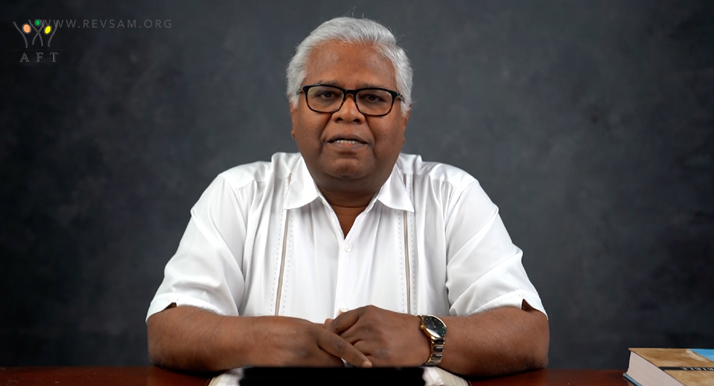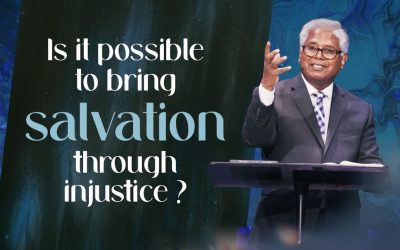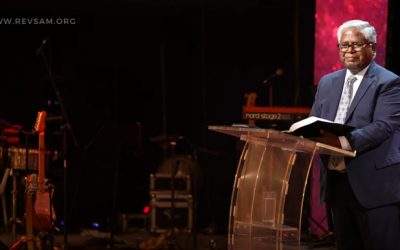
Abounding Grace (Vol 29) – The Power of Forgiveness
Sunday English Service – 17 JAN 21
Transcript
We have been doing a series on grace and we have titled the series is abounding grace. The title comes from Romans chapter five and verse 20, where the apostle Paul says, “Where sin abounded, grace did much more abound.” Means that sin exercises a lot of power over a person’s life and totally ruins and destroys everything, but grace is even more powerful, it abounds even more. And when it comes into the life of a person at salvation and thereafter, it begins to put back everything together, put back everything that was destroyed through sin and in the end makes it more beautiful and wonderful than it ever was and than it ever could be. So this is a story of the work of grace in people’s lives in changing them.
Now, in looking at this, we went to so many places, then finally came to Luke chapter 15. In Luke 15, we have three wonderful parables of grace and we are dealing with them. But the context of Luke 15 is very important, because the context is the thing that makes these parables very meaningful. What is the context? Jesus is preaching and teaching as usual, and among the audience on the one hand where the people that were called sinners and tax collectors in those days, social rejects of the society is people who are despised by people because sinners meant these people included people such as the prostitutes and so on. And tax collectors were Jewish people who collected taxes from the Jewish people to give to the Roman government. So they were hated and they were called sinners also. They were despised by their society. And on the other hand, there was the Pharisees and the scribes. They claim to be very spiritual people and the people that taught the law and so on.
Now, these Pharisees and scribes were murmuring about why sinners and tax collectors are there. In fact, they’re probably in the front seat because the Bible says that they came near to him to hear him. So they’re probably in the front seat and they don’t like it. How can you admit people like this in a community of spiritual people, in a spiritual community, they shouldn’t have no place? They were rejects of the community as such, but in a spiritual community where people come together to worship God and to hear God’s word, they should have no place, they thought, and they were objecting to it. And in order to answer their objection, Jesus gives these three parables. So their objection was about that these people are not worthy to be part of this community, this spiritual community, and the answer that Jesus gives is I have come to put together a new kind of spiritual community, totally different from what the Pharisees and scribes have prescribed as the rules for membership.
He says in this spiritual community that I am putting together, every single person will be a grace person in the sense that they would have had a profound and personal experience of grace, God’s grace in their lives, where they would have realized their lost less, their sinfulness and that their helplessness and that they would have experienced God’s help in coming and changing them. And it’s constantly changing them even now. And these are people that are experiencing God’s grace and have experienced God’s grace in a profound manner in their life. Those are the people that will belong to this community. That’s the community today, we call the church, the body of Christ, the people of God. So this is a very important teaching, very significant truth here. So in answering the murmuring of the Pharisees and scribes, Jesus gives these three parables.
One thing that everybody knows when you read the parable of the prodigal son, is that one major topic that is covered here is forgiveness. The other one is repentance, and we talked about it already. Forgiveness is another major topic that is covered here. So we’re going to look at forgiveness today. We’re going to look at what this parable teaches about forgiveness, and then ask the question what kind of community we will be if we took this teaching on forgiveness seriously today. So we’re going to look at four things today about forgiveness. One, that forgiveness is aggressive. That’s what this parable teaches. Forgiveness is aggressive in nature. It’s that kind of forgiveness. Secondly, that forgiveness is sacrificial. Thirdly, that forgiveness comes from inner empowerment. There is a power inside that motivates and helps to forgive otherwise you cannot. Fourthly, that forgiveness leads to a total restoration or if you want to use the word from this parable itself, resurrection, he said, “My son was dead and now he’s alive.” Alive means he was dead, now he’s resurrected. That’s what he means. So forgiveness leads to a total restoration, just like the son was restored back to the family completely.
So let’s talk about these four things. The first thing, forgiveness is aggressive. The first thing we learn about forgiveness here is that the father runs to the son and pounces on him and literally the language there in verse 20 in the last couple of lines is that he fell on his neck and kissed him. Now if you’re a father, standing on your portico and looking out, and they’re at the end of the street, you see someone coming and you wonder who that is. And as he comes nearer, still far away, you can see that it is your son who left you. The son who has taken a third of your wealth and gone. And you heard that he had squandered it all among prostitutes and become penniless like a bigger and there he comes. And just imagine the father knows that he’s an idiot, crazy, arrogant. And he has done the ultimate damage to the father in many ways. And there he comes, what will the father be saying inside of himself? You think he’ll be saying, well, surely, he is repenting, that’s why he’s coming. I think not.
An average father would think, here he comes, I know why he’s coming. He wants more money because he’s exhausted everything, he has spent everything, he wants more money. That is why he’s coming. This father not knowing anything about what’s in the son’s heart, whether it is truly repented or what. And it doesn’t seem to matter to him because as soon as he saw that it was his son, the father runs from the portico, falls on his son, kisses him, and gladly welcomes him and is very happy about the fact that he’s back. The father does not make the son come to him. The father does not make the son beg him for forgiveness, plead with him for forgiveness, or even ask him for forgiveness. He just gives it without even being asked. That’s why we say that forgiveness, the way that God forgives, the kind of forgiveness that the Bible teaches is the forgiveness that is aggressive. What do I mean by aggressive? Aggressive means that it takes the initiative.
The Bible says he first loved us. We didn’t love him first. He first loved us and God’s love is like that. It’s aggressive love. He goes ahead and He loves us. And that is the kind of forgiveness we see here, because the father doesn’t sit and say, well, if he wants to come, let him come, let him growl at my feet, let him beg and plead and cry and let him realize he is false and let him be humiliated, and then repented, and then maybe I’ll forgive him. That’s not what the father said. This father, he runs to the son without even any conditions of repentance or any such thing, unconditionally he forgives and he embraces. Now, why is this so important? This is so important because the Bible teaches forgiveness everywhere like that, in Mark chapter 11, verse 25, they have a wonderful statement about forgiveness. Verse 24 is about prayer. What things are there you desire when you pray, believe that you receive them and you shall have them. So it’s about prayer. And then in connection to the prayer, verse 25, the next verse says, and whenever you stand praying, if you have anything against anyone, forgive him, that your father in heaven may also forgive you, your trespasses.
When you’re standing in prayer, if you have something against someone, forgive him, forgive him right there. Don’t wait for him to come. Don’t wait for the wrong door to come before you and plead for forgiveness. Forgive him right there. When you remember that you have something against someone when you’re standing and praying, right there, right when you’re praying, right there forgive him. That’s the way the Bible teaches. And that is what is being illustrated here also. But that’s not the way things work in this world, right? We kind of stand in our porticos in our house and we say, well, he started it, she started it. If they want to make it right, fine let them come, maybe I’ll think about it, maybe I’ll come down, if they come. Let them take the first step. Jesus says, no, that’s not right. You don’t stand on your porch. You don’t wait for them to do something. You forgive, you reconcile, you offer love. Matthew 18 also says the same thing says, if your brother sins against you, go show him his fault, if he listens to you, you won him over.
That’s what Matthew 18 says. Matthew five says similar things. Therefore, if you’re offering your gift at the altar and there remember that your brother had something against you, leave your gift there in front of that altar right there and go and set that right. First go and be reconciled to your brother, then come and offer your gift. So it’s talking about, as you pray, we need to remember that you have something against someone. You have some grievance against someone. You leave your gift there, go immediately right there at that place where you’re standing in prayer, set it right, forgive him, do something right then and there do something. You take the first step is always your move. That’s the way the Bible teaches. And that’s exactly what this parable also teaches. But that’s the problem in this world. We all stand in our porticos, we wait for them to come because we think, well, we’re on the right, they’re on the wrong. Then we weigh each other and we try to decide who’s more wrong, and who’s more right. So whoever is more wrong, they should take the first step.
These are the things that goes on in this world. So we stand in our portico and we said they started it, let them come, then I will consider it and so on. And the other party, they also stand in their own portico in their houses. And they think, let him come because he’s on the wrong. He’s the one that started it. Let him come first. And this is the way our minds work. This is the way our hearts work. And the whole world is like that. Everybody sitting in their porticos and waiting for the other to come. But Jesus says my forgiveness, my love is aggressive. It takes the initiative. It loves first. It goes ahead and does it.
Secondly, forgiveness is sacrificial. So forgiveness is aggressive, in its nature, it’s aggressive. That kind of forgiveness. It takes the initiative. It takes the first step, that kind of forgiveness. Secondly, forgiveness is sacrificial. There are two ways in which this younger son has the wronged the father. First, he has wronged the father financially, just imagine he has taken a third of his wealth because there were two brothers, the father’s wealth must be divided among them. In the custom of that time, the elder gets double. So the property has to be divided into three shares. Two must go to the elder brother. One must come to the younger. So this guy has actually taken a third of the family fortune. Took it away, went to a far country and how did he spend it? He didn’t go into some business and run into a loss or something like that. He went and just spent it among prostitutes, the elder son accuses him and lived a prodigal kind of living and spent it and wasted it all and completely lost it. And so one third of the family’s wealth is gone because of this guy. Permanently lowered the family’s wealth by one third. So there’s a tremendous financial wrong that he has committed.
Secondly, he has sinned against his father by disgracing him before others. The culture and the society in those days was a shame culture and an honored culture. And we understand that because a lot of our societies are like that. Shame and honor are very much part of the society. And that’s why I believe Eastern people are more able to understand the Bible because it’s closer to our culture. The Western culture is basically individualistic. They don’t worry about shame and honor and all that. Mostly, they’re not worried about families’ name and so on. Not so much. So in this society, in which this story is told for the son to treat the father that way meant that the father had lost face before the people of his society. He had lost his in a reputation. He was no longer regarded as a person of great respect. It was a tremendous blow. It was a terrible sin. He robbed his father of his social capital. He robbed his father of his status, of his good reputation, of his money. So he has robbed his father of all the things that are so important in his life. And that’s the reason when the son comes back in the story, the son seems to know that the only way he can get back into a relationship with the father and be a part of the family, is to do something about these two things that he has damaged.
He has damaged the family’s wealth. One third is gone. He has damaged the father’s reputation; he has disgraced the father. So he’s got to set it right, he’s got to deal with this dual debt and paid back somehow then only he will have any right to belong to that family, he realizes that. That is why he says two things. One, he says, “Make me like one of your hired servants.” Because he wants to pay back the financial debt. He’s thinking, well, I’ll work. I’m not asking you for a free ride. I’m not asking you for any money. Just let me work. And you pay me. And I will work night and day, I will work overtime and I will work hard. I will put out such labor that I will earn it, earn everything that I lost and restored the family’s wealth again. And one day when I’ve worked enough and I’ve restored it enough of the family’s wealth that was lost because of me. Then on that day, you can take me as a son until then just let me be a hired servant, he says.
Secondly, he says, I’m no longer worthy to be called your son. So here, he’s trying to pay back his social debt, his emotional debt. The fact that he has disgraced his father, he’s trying to set it right. So he’s saying, I’m not assuming that I have the right to call you father. I am humiliating myself before you. I’m growling before you, I deserve this. I’m abasing myself before you. I will not assume that I have the right to call your father. Don’t call me your son. No, I’m not asking to be called your son and I’m not asserting my right to call you father. Just let me be here. Just allow me to work and pay back this debt that I owe you. I’ve disgraced your name. So I’ll be a good boy. I’ll behave. I’ll be better from now on. And I’ll earn your favor one day, where you will yourself be very proud of me because I’ve turned so good and that I will restore your name once again and your respectability once again, that’s what he’s trying to say. He’s trying to payback. He’s trying to make good on both the debts that he owes, but the father won’t let him.
And here’s where we have their sense of what forgiveness is. Here is the revelation about what forgiveness really is. Forgiveness is really sacrificial. If you look at forgiveness, there is a sacrifice involved. Look at what’s happening in here. The father runs and I’ve told you, fathers, patriarchs don’t run. Moreover, it’s the inferior that should approach the superior, the inferior should come. The younger should come to the older, the inferior should come and approach the superior. The superior will never come to the inferior or the older will never come to the younger. That’s the way it was done in that culture. But here, the father doesn’t seem to care about all that protocol. He runs to the son as if he’s the inferior and the son is something superior. And not only that, it doesn’t just go to the son, he just runs to the son. What does this running to the son mean? What message does it carry?
It shows that the father will not let his son try to pay back the debt that he owes to him when he disgraced him, when he ruined his reputation, his name before that society, the shame that he brought on him. He doesn’t want the son to be humiliated. He doesn’t want the son to gravel at his feet. He doesn’t want him to beg him. He doesn’t want to stand on his pride. He does not do anything here that a patriotic in that culture of shame and honor would do in order to restore his name that is lost. He doesn’t do it. He doesn’t even think of doing, he is running to the son. He’s lowering himself. He’s welcoming the son because he wants to show, I don’t want you to pay anything. I don’t. I know you’ve ruined my name big time. You’ve disgraced me, but I’ll take care of it, don’t worry, you come. That’s the thing that it shows.
Secondly, he doesn’t even want him to pay back his financial debt, because the son says make me one of your hired servants. I’m going to pay you back, but what does the father say? He says, put the best robe on him, bring the ring and put it on him. And the ring is a thing by which you sign, it is a stamp that you put on the paper documents there in those days. When you execute a document, it is the ring, that is the signature. So he makes them authorized signatory of the family. He can sign on behalf of the family, make contracts. So that’s how far he goes, restores the guy’s honor, slaves walk without any sandals or shoes. Sons don’t walk without shoes. So he says, bring him sandals and put it on him. So he immediately restores him without anything from the son, not expecting him to pay back anything. He says, don’t worry about the financial debt. Yeah, the money is lost, one third is lost, never mind. I’m not thinking about it. You are received as a son. Here’s your sandals, put it on. Because you are a son, you shouldn’t be without sandals. Here is a robe, put it on because you’re a son. You’re not an employee, you’re a son. That’s the way he treats him.
So what the father is saying is this. Let me put it in this way, what the father is saying is that he will absorb the debt. He says, I’ll take care of the debt, you ruined my name, I’ll take care of it. You got rid of my money. One third of the wealth is gone, but I’ll take care of it. I will absorb the debt. I’m not going to let you pay back. I’m not going to let you assume this debt. I am going to absorb the debt. I’m going to take all the loss on me. Everything is on me, I’ll take care of it. I will be responsible for it. I will worry about it. I will do something about it. You don’t have to do anything. Now, this is the essence of what it means to forgive somebody. When someone wrongs you in some way, sometimes they’ll rob you of your money. Sometimes they rob you of your happiness. Sometimes they rob you of your reputation, like in this case. Sometimes in this world, people rob us of opportunities. Sometimes they are rob us of what rightfully belongs to us.
And when someone wrongs us, there is always a debt, they owe us something, right? Because they have wronged us. They owe us. And there are two things that you can do with the debt. One, you can make them pay back or you absorb it yourself? Either they pay or you pay, either they pay back or you absorb all the loss. These are two ways to deal with it. And the father says, I’m going to do it, I’m going to absolve the debt. That’s the way the father handles it. In other words, forgiveness is absorbing pain instead of inflicting it. He doesn’t want to make him pay because to make him pay will be inflicting pain on him. He doesn’t want to inflict any pain on him. He wants to absorb all the pain, take all the pain, all the loss to himself. Usually when someone wrongs us, we want to make them pay. They’ve hurt our reputation, we want to make sure that we hurt their reputation so that they will know what it means to suffer like that. If they’ve robbed us of our happiness, then we would like in some way to make them unhappy. So that they’ll know the pain of what they’ve done to us.
We can make them pay, but that’s not forgiveness. When you make the wrong doer pay for what he has done to you, that’s not forgiveness. Forgiveness is taking that pain on yourself. Forgiveness is the readiness that you have to absorb that debt to take the debt on yourself and suffer that debt. So therefore, forgiveness is always a form of suffering because you’re taking that pain. You’re taking that loss on yourself. Your name is ruined. Your money is gone, but you said, don’t worry, I’ll deal with it. You’ll deal with the pain. You’ll deal with the consequences. You’ll deal with the loss, the diminishment of wealth, the whatever it is. You’re saying, I’ll take it, I’ll deal with it. So forgiveness is always a form of suffering. It’s absorbing pain instead of inflicting pain. In the story, how did the father do it? After all that, the son did, taking away the wealth and ruining his name and disgracing him before the society. The father runs to him and kisses him and hugs him.
Why? If the father sat at home all these months that he’d been gone, the son has been gone, and was thinking about all the evil that fellow has done, the money that he has taken and the way he has wasted everything, and if he had been thinking about this all these months and hating him in his heart, clobbering him in his heart, beating him in his heart and violently hating him in his heart, then when the son showed up, that’s exactly what will come out because he has been doing it in his heart, and that’s what is going to show up when the son comes, right? But what was the father doing in his heart? Obviously, we can tell by his actions, when the son came, what he has been doing in his heart all these months, as he waited for his son to come, he was loving the son. He was having compassion on the son, because here it says, when he saw him coming a far off, he had compassion on him and run to him and hugged his neck and kissed him. So, that’s what he’s been doing, sitting at home all these months, thinking about his son, loving his son, having compassion on his son, thinking about his well-being, feeling pity, having mercy, wanting him to come back. That’s what he’s been thinking. That is why when he came back, he did those things.
Now this shows what it means to make a person payback also for his wrongdoing. Because here in this story the father obviously has been sitting at home, loving the sun, having compassion on the son, right? That is what it must have been doing, because that’s what he shows when he comes. How do you make him pay back? If the father wanted him to pay back everything that he took and lost and ruined. You know what the father would have been doing? Sitting home, clobbering him, beating him in his mind in his heart and being violent towards him in his mind and his heart. And then when the son came, he would be doing it in action, literally. Because he’s been running that video tape again and again and again of all the things that he had said and done and damaged, that’s what we do many times when we make people payback, you know how we make them pay back. We’re sitting there at home. We are running the video again and again in our mind, what that person said about us, how he ruined our name, how he took our money, how he cheated us, thinking again and again, you replay that video tape, rewind and replay again and again and again. Then when you get a chance to meet them, or when you get a chance to do something against them, you try to ruin their reputation, you try to cause some financial damage or whatever damage that you want to cause them.
Or if you meet them, you want to avoid them, you want to be rude to them, you want to be cold to them. That’s the way you make them pay back. Because these kinds of reactions come out of what you’ve been thinking in your heart and what you’ve been filling your heart with all this time, you’ve been running the scenes again and again, what that person said, what that person did, talking mulling over it again and again. So when you see the person you’re reacting like that, that’s making people pay back, but forgiveness means you love them in your heart. You turn away from anger in your heart even before you see them. In your heart, you turn away from that. That’s why it says, when you pray, if you have something against someone, forgive them, right there. Right there, turn away from your anger. You pray for them. You will their good, you wish for their wellbeing. When you have a chance to do good, do good to them, and when they actually do show up like this son, when they actually one day come in front of you, then you would want to hug them. Then you want to really show compassion to them in every way.
he father paid the price. He absorbed the debt in his heart. So he was able to reconcile with his son when he came back, because he’s already in his heart. He has reconciled with the son. Already in his heart, he has absorbed the debt. He had decided that he would suffer the loss. It’s all right. He will take it. He will take that burden. This is the anatomy of forgiveness. This is what forgiveness consists of. It’s a sacrifice, tremendous sacrifice. It’s absorbing the pain instead of inflicting the pain. What a wonderful thought and how many times in this world we think of inflicting the pain. We think of the many ways in which we wanted to make people pay back for what they’ve done. But the Bible teaches really the art of forgiveness, the anatomy of forgiveness. And we know what forgiveness is. It’s aggressive. It initiates the action. It goes first. It says, I forgive you before the person asks you forgiveness. You have decided in your heart that you’re going to forgive.
Secondly, forgiveness is sacrificial where you are willing and ready to take the loss on yourself. Whatever is done is done. Whatever is damaged is damaged. You’re ready to suffer the loss, you need to suffer the pain, and you will decided that you will not inflict the pain. You will not hold them responsible for that, you don’t expect them to pay for it. That’s what forgiveness is all about. Now, this is not an easy thing to do. Spiritually and emotionally, it’s not an easy thing to do unless you have an inner power that enables you to do it. That’s the third point we come to. Forgiveness is empowered from inside. There is an inner empowerment that enables you to do this thing. This kind of forgiveness. Where you are ready to sacrifice, you’re ready to suffer, whatever damages have been caused, and you’re ready to release the other person. So forgiveness is empowered from inside.
Look at this third thing. When the father sees the son, we are told something about the father’s heart. You realize that in the story, when the father sees the son and the way he acts tells us something about the father’s heart, that’s the intention of Jesus in telling the story. What does it say in verse 20? It says, while he was still a long way off, his father saw him and was filled with compassion for him. There is a great big Bible teacher named BB Warfield, Benjamin Warfield, very celebrated theologian and teacher. He wrote a article or essay on The Emotional Life of Our Lord, it was titled as that. And it was a study of all the words that have to do with Jesus’s emotions. One of the most striking findings of that essay is that there was one Greek word that was used of Jesus’s emotions, more than all of the words put together. And that word is compassion. In English, it’s compassion.
It’s a word that literally means to be moved from the very depths of your being, in love for someone to love someone, from the very depth of your heart. That word is so often used of Christ. The gospel writers, Matthew, Mark, Luke, and John, you’ll find it very often. The gospel writers telling that story of Jesus, say he was moved with compassion. That’s the way they describe him. Yet Jesus uses this word that is really his signature on this father in this story. So that it says, while he was yet far away, the father saw him and had compassion on him. Why does he use the same word compassion in describing this father’s in our heart? Because he’s inviting us to see him in this father. He’s inviting us to see himself in this father. The word compassion is about Jesus. The word compassion is the best-known word that describes Jesus’s heart, his emotion. And he uses it deliberately to describe this father and what he was thinking, what his heart was like. Why? Because he’s inviting us to see himself in this father and through this father.
And you know what you see? Here’s what we’re going to see. The father did not stay in the place where he saw the son. He saw the son a far off, from his portico maybe. He runs to the son, by running, he is actually coming down, the older running to the younger. Patriarchs don’t run, and he’s running. If somebody you really, really love has rejected you, that hurts horribly and you never want to make yourself vulnerable again. You never want to open up again to them. You never want to bare your soul to that person again, unless you’re really, really sure that person has changed. And guess what? This father is running to the son in order to forgive him, in order to reconcile to him, knowing he might get abused again. That’s the wonder of the story. Who can guarantee that this younger brother, such a fool, such a crazy idiot, kind of guy will not abuse the father again? He might be wronged again. He might be sinned against again, but yet he goes running to his son even though he knows there’s a really good chance that he’ll be emotionally rejected again.
What do we see here about Jesus? We are told in the gospel of John, that he was in this world and though the world was made through him, the world did not recognize him. He came into his own and his own received him not, the Bible says, gospel of John says. Isaiah says that he was despised and rejected of men, a man of sorrows, he was. In Romans we read, while we were yet sinners, Jesus died for us. This is Jesus. Same thing that you see in the father told in the story, the compassionate father in this story, the compassion that we see in this father is what we see in Jesus. That is what he wants us to see. What do you see about Jesus here? Here, you look at the father in this story, he is a father who loses his dignity, he is running. Even though he’s older person, he should never run. He’s running. He shouldn’t be going to the younger like this, but he’s running. He doesn’t care about his dignity, makes himself vulnerable and goes for the forgiveness of his son. Even though he knows there’s a risk of being emotionally rejected again.
Jesus Christ didn’t lose just his face. He didn’t just lose the little bit of his dignity. He was not just showing his legs and running. That was not the thing. He was stripped naked on the cross. He didn’t lose just a little bit of his dignity. He lost his glory. He came running from heaven to earth, knowing that he may be rejected, knowing that he’ll be ultimately killed, rejected, and killed, put on a cross and killed. He didn’t come to running thinking that he might be rejected, there is a possible divergent. No, he came knowing that’s what exactly what they’re going to do. He will be rejected, that he will be put on a cross. Talk about making yourself vulnerable, he did. He didn’t just throw his arm around us. He opened his arms and was crucified on the cross of Calvary. Why did Jesus do it? He was observing the debt, the debt that we owed, we sinned against God. God gave us our lives. God gave us the world. God gave us a whole lot more than just one third of this man’s wealth in the story. We all got so much. We ruined a whole lot more than one third of the estate that is spoken about in this story and what has God done? He’s not standing in his house, waiting for us to get to heaven and plead there with him to enter into heaven, so that he can consider our entry into heaven.
He comes from heaven to earth and instead of inflicting pain, he absorbs it. Instead of making us pay for our sins on the cross, he’s paying for our sins on the cross. He is suffering. When you look at the cross, you see God doing exactly what we need to do when we are wronged. He’s showing exactly what we need to do when we absorb a debt. So he’s decimated, he’s destroyed. And why does he do it? He is paying the price and everyone who receives Jesus Christ as their savior will literally experience the embrace and the kiss of Jesus. God loves us. And if you see that he did that for you, to remove you from the depths of your being in love. And here’s why, there are two things. You have to have inside if you’re going to be able absorb debts, we talked about forgiveness as sacrifice where we’re ready to absorb debts, but in order to really absorb debts and suffer the pain, instead of inflicting pain on the wrongdoer, we have to have two things.
One is, an emotional power and the other is a spiritual power. Two things you need to have on the inside in order to forgive like this, in order to absorb debts like that. And when you absorb a debt, when you absorb pain instead of inflicting pain, you’re freeing a person, something tremendous happens. You free yourself from the past, you make it possible to heal, that relationship to heal and all kinds of great things happen but how can you do it? You need an incredible amount of emotional power and spiritual power on the inside in order to forgive like this, in order to absorb debt, it in order to take that pain on yourself instead of inflicting pain, in order to not make the person pay, but you’re willing to pay. That’s real forgiveness in order to do that, you need these two things, the emotional power and spiritual power, incredible, tremendous amount of emotional, spiritual power, which can only come from God.
It must come on the inside in your heart. Why? Because only when you have that, you can do two things that needs to happen. What are the two things that needs to happen? You must resist the superiority and release the liability. What are we talking about? The incredible amount of emotional, spiritual power inside of you. It gives you the ability to resist superiority. What do we mean when we say, resist the superiority? All grudges understatement that we hold in our hearts to a great degree are based on a sense of superiority. You can’t be mad at somebody for what they’ve done, unless you feel superior to them. You notice when people are mad at others who have done wrong to them, they always say something like I would have never done that. I have never done that to anybody. I would never do that. But if you really understand the gospel, you will never have that kind of superiority. You will never have that sense of superiority. You will never look at another person, say I’m better than you, I would have never done that, I have never done that, I would have never done that. You will never say something like that because when you understand the gospel properly, you can only say I’m no better than you. We’re all sinners. We’re all lost. We’re all totally helpless. We’re all the same. We are all affected by sin in the same way.
Therefore, fundamentally we are the same. I’m no better than you. That’s exactly what the Bible teaches. That’s exactly what you will say. And if a believer stays angry at somebody then he has not even thought about this and does not understand this truth of the gospel and what it really means. The gospel basically puts us on all on the same level. All of sin and come short of the glory of God and if you understand that, you’ll say I’m no better than others. So the gospel gives you the power to resist the superiority. That’s what I mean by resist the superiority. You will not say I’ve never done that and I would have never done that. Look what this guy has done. He has done this terrible thing. I would have never done that. No, we’re all the same. So where did that power to absorb that come. It came from this tremendous emotional and spiritual power that is inside of us. That enables us to absorb the debt. It helps us to think this way, it gives us the power to resist the superiority.
Secondly, it gives you the power to release the liability. What do I mean by releasing the liability? Basically, forgiveness means that you no longer hold the person who has done wrong against you liable for their debt. You don’t hold them responsible for the damage they’ve caused, because you’re forgiving them. You are saying, I’ll bear the debt, I will pay for it. I will absorb the debt, I’ll not make you payback. I will take that pain. That’s what forgiveness is. Therefore, you’re no longer holding that person responsible for their debt. If you still feel like they owe you something and that they need to pay you back, then you will end up treating them a little harsher and push them a little harder and treat them a little colder, realize that because you’re holding them liable. You’re continuing to see that they’re owe you and forgiveness is you cancel that. You observe the debt, you release the liability and people says, how can you do that there? How can you simply release? It’s very, very simple.
If you have thousand crows in the bank, sitting there in your account, it’s very easy to forgive a thousand-rupee debt. Why? Because you got a thousand crows sitting in the bank, thousand rupees is nothing. Just imagine Bill Gates coming to India and somebody picking his pocket for a thousand rupees, and he loses thousand rupees and going and sitting, and waiting in a police station for half a day, trying to write a complaint about thousand rupees, he lost. Never happened. It will never happen, because he’s going to just go on, forget it because he’s got so much, why would he worry about thousand rupees, to the degree you understand what Jesus has given to you and what you have really in Christ. You’ll be able to release others from liability. This is the amazing thing about this truth. If you understand what you have in Christ, you know that you are the world’s first trillionaire. If you understand what you have in Christ, you know that you have everything. If you have everything, and if you have everything in abundance, then how could that person that has wronged you take away anything from you? What has he taken away from you? Has he taken away your reputation?
How can they take away your reputation? You as a Christian know the honor of being a Christian, because you know what it’s like to have the Lord of the universe, crown you with his love and delight. You’ve received acceptance from the father. You’re in a relationship with God. You know that God loves you. Therefore, how could somebody just take away reputation? Why do you care about that reputation? You have inroads with God. You have a connection with God. You have the love of God. What could anybody take away? Have they taken away your money, your opportunity, your happiness? Think of what you have in Christ. That’s the power from within you that you need in order to really forgive. This is the empowerment I’m talking about, something inside, a motivating power motivating factor must be there inside. That this is what will enable you to forgive. Unless you have this tremendous emotional power, this emotional wealth, the spiritual wealth on the inside. If you have the tremendous abundance on the inside emotionally and spiritually, then it’s very easy to forgive the debt on the outside.
Fourthly forgiveness leads to a total restoration or resurrection. I said resurrection because here the father tells us in verse 24. He said this, my son was dead, he is alive again. What he means is he was dead, but now he has come back to life. He has been resurrected. What was he dead to? He was dead to the community; he was dead to the family. He was dead to the relationship. He was dead to his relationship, to his father, relationship to the family, relationship to the community that he came from. What has happened to him now? He has come back now; he’s accepted by the father. He’s got a new robe on, he’s got a ring on, he’s got sandals on, he’s got dignity back, he’s a member of the family. There is a total restoration. A resurrection has happened. He was dead in that way, lost by the family, dead to the family, dead to the relationship, dead to the community. Now he’s come back and become a lot of that community, that family, come back and become a son to the father. So that is a restoration, a total restoration, or resurrection.
Let me say a few things about it. I want to talk about what kind of community would it be if we take this teaching of forgiveness really seriously. First of all, we would be a community in which reconciliation happened all the time, out in the world, people will not admit their resentment. They’ll always say, well, I don’t have a grudge, I don’t have anything to do with that person. And they kind of dismiss it while all the time having it inside of them. How do you know if you have a grudge or resentment against somebody? Do you have any tests to see whether you have a grudge or resentment against anybody? Yes, there is, a very simple test. And you know what that is? If you know that the failure of the person that wronged you would bring you some kind of satisfaction. If you know that some misfortune, they suffer, some failure that they suffer will bring you some kind of a satisfaction, some kind of a happiness. If you think that their unhappiness would actually make you happy, then you have a grudge, then you have resentment inside.
And Christians are people who should know that and must not deny that. So when we go and reconcile, we don’t use confrontation to punish. What we do is we do what Mark 11:25 says, what does Mark 11:25 say? It says, that whenever you stand praying, if you have anything against anyone, forgive him. So we before even going, forgiveness has already happened. They forgive before they go. If you forgive them in your heart, you use the part of the gospel to get rid of the superiority and to release them from liability. Then you won’t go to confront them now. You’re not going to go there to make them feel bad now. You’re not going to go there just simply to get something off your chest, to show them that they’re wrong. Well, you may need to sometimes go and show that they’re wrong, but in a very good way, for their sake, for God’s sake, for the relationship sake, for love sake, you may have to do it, but not in order to pay them back. Not in order to make them feel bad or condemn them.
What happens out there in the world is when somebody wrongs you, you just avoid them. You deny you’re mad against them and you don’t go and confront them until it gets really bad. Then you would go on to go and confront them and make them feel really bad. And it just makes everything worse than before. So we should be a community in which this is happening all the time. Do you know why? Somebody said, well, you should live in such a way that you never have to say, sorry, well, that sounds nice. But the fact is that we come from such a sinful background. And even though we have come to faith in Christ and that the work of God’s grace is happening in our lives. We’re still imperfect in so many ways. We’re growing up in so many ways that we’re bound to make some mistakes along the way. So in order to deny, that is to deny reality. So to say that I’ll never have to say, sorry, that’s the way I live. It’s wrong because we’re not such perfect human beings. And because of that, we rob each other the wrong way all the time. It happens because we were still learning and you should be constantly having to reconcile. So we are to be a reconciling community.
Secondly, we need to be a persuasive community, not resentful or hateful or belittling community. We need to be a persuasive community. When you’re bitter against someone, you form a picture of that person that has wronged you in your mind in the most negative way possible. You turn them into a one-dimensional cartoon figure. Let me give you an illustration. Sometimes you are mad because somebody lied to us or something like that. We are mad because they lied to us. But let me ask this. Have you ever lied? You shouldn’t lie, I know, but have you ever lied? And if you find out that this person has really lied and you have any proof when you confront them and say, you lied in a way, are you so mad against him? They’ll always give you two, three reasons why they had to lie. Well, the situation was like this. I had to do it. There was some reason for this. So some extraordinary reasons. That’s why I had to lie.
Well, that shows that you look at yourself in a three-dimensional way. And you look at the other person in one dimensional way, you look at them as a plain flat liar, that’s all. You can’t see any other side of him. You just look at him as a plain flat liar, but you look at yourself in so many dimensions. Well, there was this problem that pulled me and there was such an injustice and this was done to me. That was, that’s why. Yeah, I understand. But how come you look at yourself like that? You look at the other person like that? And that kind of spirit can come among people of God sometimes, if you don’t watch out and when it comes, that shows that we do not have this tremendous emotional and spiritual power on the inside. What is this tremendous, emotional and spiritual power on the inside? We are not filled with the realization and the knowledge and the revelation of who we are in Christ, how much we possess that we have everything, that we have boundless love of God. We have everything that nobody can take away therefore anything from us, nobody can diminish us. Nothing that anybody does can diminish us. We don’t have that knowledge inside of us. And therefore, we look at others in that way and we are not able to let them go. We are not able to forgive them the way that we should be able to forgive.
Thirdly, we have to be a community in which we let people go free from their past. The past can be a terribly troubling thing. If you don’t deal with it. For example, the determining factor in your relationship with God is not your past. It is Christ’s past. Our relationship with God is not based on your past. It is based on Christ past, what he did 2000 years ago. It’s not what you’ve done, but what Christ has done, do you know what that means? It means that God has detached you from your terrible past, cut you off from your terrible past, he’s not treating you in accordance with your past, your past sins, your past mistakes and so on. He’s treating you in accordance with your great future in Jesus Christ and through Jesus Christ, no matter what people have done before they got here, in Christ. Today, if they believe in Christ, no matter what they’ve done, we should not rub their nose in it. We should not bring that up and keep talking about their background. And we should not treat them differently, any differently from others, just because of their background. The old is forgotten, the old is disconnected. The past is past. Old things are passed away, old things have become new, we’re a new creation and forgiveness sets you free from the past.
A great Jewish writer has said this. They suffered a lot, a lot of injustice over the years, they’ve gone through a lot of pain and it’s very difficult to live with all that pain thinking about of all things that were done to them for so many generations. And this person writes and says, there is only one thing that can release us from the grip of our history. That is forgiveness. A hurting person needs more than anything else to be released from the painful past. That only happens if you forgive. Do you want to be stuck in your painful past? Do you want to be bashed again and again in that hurt? Vengeance is having a videotape planted in your soul that cannot be turned off. It plays the painful scene over and over again, inside your mind. It hooks you to its instant replace. Each time it replays, you feel the pain over and over again, is this fair? Forgiveness turns off this videotape, forgiveness sets you free from your past, forgiveness is the only way to stop the cycle of pain turning around in your memory.
Our only escape from history’s cruel unfairness are only passage to the future’s possibilities and creativity, is the miracle of forgiveness. And I want to say to you today, and that forgiveness is possible through our Lord and savior Jesus Christ, and his glorious gospel.
How to live by faith during evil times? | Habakkuk 1:1-17 | Sam P. Chelladurai | 7-Jan-23
தீமைகள் நிறைந்த சூழ்நிலைகளில் விசுவாசத்தினால் வாழுவது எப்படி? | Sam P. Chelladurai | 7-Jan-24 | AFT
தீமைகள் நிறைந்த...
தேவன் பேசியிருக்கிறார்! நீங்கள் விசுவாசிக்கிறீர்களா?
தேவன் பேசியிருக்கிறார்!...
God has spoken! Do you believe it?
God has spoken! Do you...
ஆராதனையின் புதிய ஏற்பாட்டு அடிப்படைகள்
ஆராதனையின் புதிய ஏற்பாட்டு...
New Testament basics of Worship
New Testament basics of...
இயேசுவில் உள்ள தேவ மகிமையை ருசித்துப்பாருங்கள்! (பகுதி 2)
இயேசுவில் உள்ள தேவ மகிமையை...
Taste and see God’s glory in Jesus! (Part 2)
Taste and see God's glory in...
இயேசுவில் உள்ள தேவ மகிமையை ருசித்துப்பாருங்கள்!
இயேசுவில் உள்ள தேவ மகிமையை...
Taste and see God’s glory in Jesus!
Taste and see God's glory in...
















